Bolzano
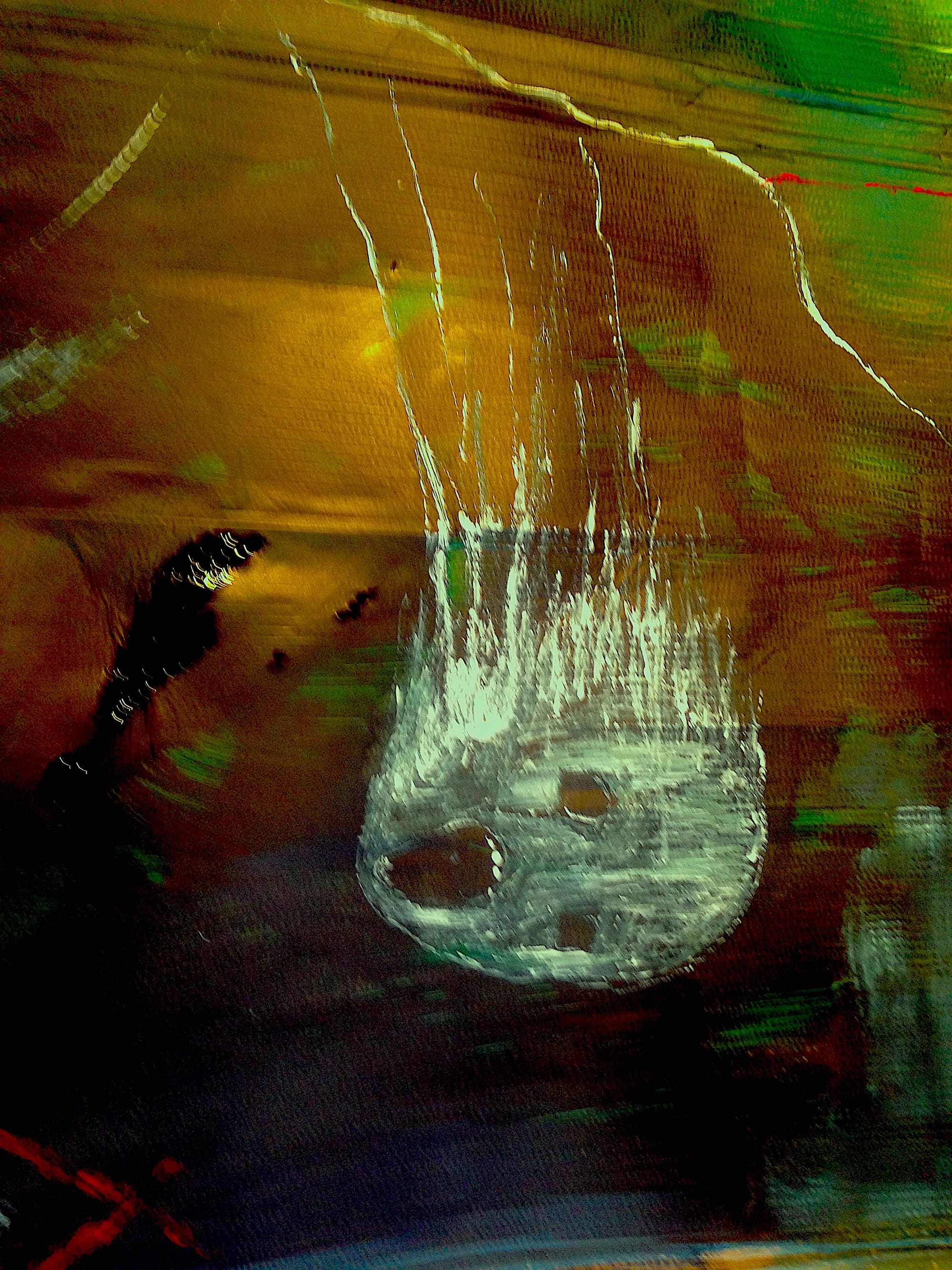
Interview by Richard Marshall

'Most of his writings date from the years 1810—1848. A great many histories of philosophy call this period the Age of German (Post-Kantian) Idealism; and certainly many philosophical works of that time fit that description. Bolzano’s don’t, though, and this is perhaps one reason why he has not received much attention in general histories of philosophy.'
'Bolzano used ‘logic’ and ‘theory of science’ interchangeably; what he called logic thus encompassed logic in the narrower modern sense as well as questions of scientific methodology, epistemology, even heuristic (the “Art of Discovery”), and the rules that govern the writing of treatises (!).'
'Hume, for example, wrote in the Treatise that every science, mathematics and natural philosophy included, would be far better off to begin with a study of the mind and its operations. According to this, Newton, in studying mathematics, physics, and astronomy, had wasted a good deal of his time, having had no option but to employ the "tedious lingring method" that was to be rendered obsolete by the new improved one, based on ... armchair psychology? I don't mean to say that scientists had nothing to learn from Hume, but this is just funny.'
'We point out certain difficulties with Quine's approach: his sentences, for instance, seem to be just as difficult to pair with actual utterances as propositions are. Their attributes go far beyond what empirical data would justify.'
'Bolzano thought that all humanly thinkable intuitions had mental states or changes as objects. So he has to try to explain how we can form ideas of, e.g., whales from ideas of those states and various concepts. On this point, as on others, his views closely resemble Russell's from the "logically proper names" period.'
'In Bolzano's view, many modern philosophers, Kant included, made the existence of cognition, or knowledge, the starting point of their reflections. By contrast, he started from the claim that there are truths, where by `truth' it is clear that he means a true proposition in itself.'
'The upshot is that many of the characteristic problems of early modern epistemology are pseudo-problems for Bolzano. For instance, not only is it highly unlikely that our ideas resemble their objects, it also doesn't matter for the purposes of logic whether or not they do.'
'The agreements with Leibniz are fairly broad (e.g., simple substances are eternal, there is a moral as well as a physical order in reality), though he differed on a number of key points.'
'In ethics, Bolzano was an act-utilitarian, though he sometimes added that the results aimed at by actions should be Pareto-optimal, i.e., the average increase in well-being should be as great as possible, subject to the proviso that no individual would be worse off.'
'In the essay on the concept of beauty, Kant's aesthetics is examined in detail. As you might expect, the logician Bolzano is not happy that Kant offered four different definitions for a single concept, nor with the shaky arguments given to support the claim that these definitions were equivalent.'
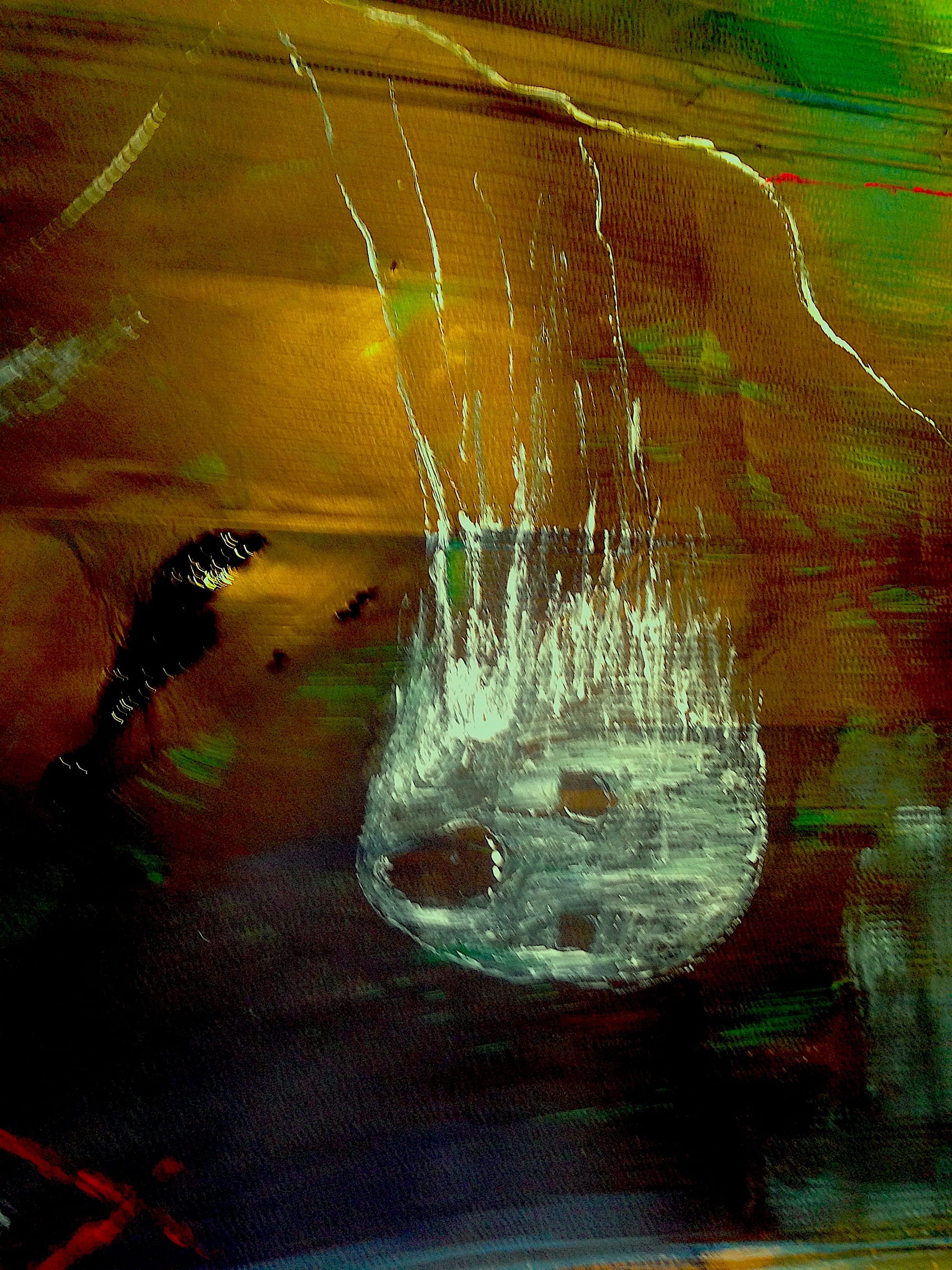
Paul Rusnock is interested in the interactions between philosophy and science, and especially between philosophy and mathematics. He starts from the conviction that some of the most important developments in the history of philosophy were in fact due to mathematicians and scientists. For obvious reasons, he was especially drawn to philosophers who were also active as mathematicians, as well as to mathematicians with philosophical interests.
For some years now, his research has focussed on the philosopher, mathematician and theologian Bernard Bolzano (1781-1848). Today, Bolzano is best known for his contributions to mathematics, logic and the philosophy of science. He was the first to propose and systematically investigate set theory as a foundation for mathematics, one of the pioneers of modern real analysis, and one of the greatest logicians of the modern period, who formulated the first viable definition of semantic consequence along with a wealth of other things set out in the monumental Theory of Science of 1837. In his own time, however, he was renowned for his work as professor of religion at the Charles University in Prague from 1805 to 1819. In this highly visible position, Bolzano had become one of the most prominent advocates of social justice and reform in his homeland (Bohemia, then a province of the Habsburg Empire). He was equally active in pursuit of ecclesiastical reform, and wrote a number of important works on religion in general and Catholicism in particular.
Though originally drawn to Bolzano through his interest in the interactions between mathematics and philosophy, he has over the years come to study many areas of his wide-ranging thought, writing on subjects ranging from religion and politics to mathematics and logic, and translating a variety of his works. He also maintains interests in the history of philosophy more generally (e.g., Kant, Austrian philosophy, Frege, 20th-century analytic philosophy), and in logic and the philosophy of mathematics.
Here he discusses Bolzano's life and context, logic and how it compares to modern logic, his anti-psychologising, comparisons with Quine, Locke and the representation of natural kinds, Bolzano's variation logic, his theory of knowledge, his metaphysics, his views on freedom and necessity, panpsychism and Leibniz, his maths, his ethics, and finally his aesthetics.
3:16: What made you become a philosopher?
Paul Rusnock: I grew up up in a house full of books, and was raised by parents who loved learning as well as the arts, especially music and literature. My father was and, at the age of ninety, still is very fond of argument. Having had excellent teachers in most subjects, I naturally developed wide-ranging interests in the sciences as well as the humanities. Philosophy appealed to me because it was one of the few disciplines where keeping such interests alive was not only tolerated, but encouraged. I was extremely fortunate to find an ideal supervisor for my doctoral work in Rolf George, who not only guided my research but also invited me to work on a number of collaborative projects. Later, I worked with another outstanding scholar, Jan Šebestík, who is co-author of the recent book on Bolzano's life and work. It is in large part thanks to these two that I was able to stay in philosophy.
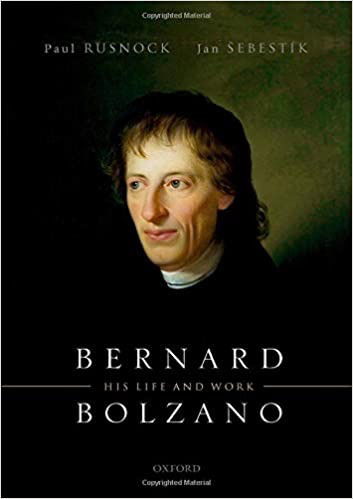
3:16: You’re an expert in Bolzano who is, oddly, not as well known as his achievements deserve compared to other major philosophers like Kant, Leibniz, Spinoza or Descartes. So before looking at his work can you say something about him: when was he working and what was the philosophical context in which he worked and which influenced him? And why has he languished in semi-obscurity for so long? Was Bolzano an analytic philosopher before that tradition had officially started? Do you think had Frege, for instance, had a better understanding of the history of philosophy, Bolzano’s impact and fame would have been greater ?
PR: Bolzano’s dates are 1781-1848. Thus his life includes the French revolution, the Napoleonic wars and the conservative reaction (in the Habsburg lands, the “pre-march” time or Vormärz). Most of his writings date from the years 1810—1848. A great many histories of philosophy call this period the Age of German (Post-Kantian) Idealism; and certainly many philosophical works of that time fit that description. Bolzano’s don’t, though, and this is perhaps one reason why he has not received much attention in general histories of philosophy (there are noteworthy exceptions, however: for example, the third volume of Anders Wedberg’s A History of Philosophy bears the subtitle: from Bolzano to Wittgenstein.). A second reason for neglect is that some of his best and most influential work was in the foundations of mathematics. According to Bolzano, and I think he was right about this, such foundational work belongs to both mathematics and philosophy. Generally, though, while work on the foundations of arithmetic (e.g. Frege’s) is often recognized as philosophical, work on, e.g., the foundations of geometry or the calculus is considered to belong to mathematics but not to philosophy (again, there are exceptions: Abraham Robinson and John Lane Bell come to mind here). A third factor was political: Bolzano fell into disfavour with the authorities in Vienna and was comprehensively persecuted: removed from his professorship at the Charles University in Prague, forbidden to teach, unable to publish works under his own name, etc. (the restrictions were relaxed somewhat after the death of the Emperor Francis in 1835).
As Jan Šebestík and I note in our book, Russell, in his History of Western Philosophy, wrote that the origins of analytical philosophy lay ‘’in the achievements of mathematicians who sought to purge their subject of fallacies and slipshod reasoning.’’ He speaks in particular of the work that put the infinitesimal calculus on a sound footing, as well as work on the concepts of continuity and the infinite. He names Weierstrass and Cantor in this connection, and afterwards Frege. He does not mention Bolzano, though he certainly might have, for Bolzano did groundbreaking work in precisely these areas, and some of his works were known to German mathematicians, among them Weierstrass and Cantor. If we add to this his “anticipations” of set theory, Tarski’s notion of logical consequence, Quine’s notion of logical truth, etc., it seems fair to us to look upon Bolzano as an analytic philosopher.
It is a shame that Frege, as far as we can tell, never read Bolzano’s works, for Bolzano was one of a small number of logicians that Frege could have learned something from. On the other hand, Husserl, Twardowksi, Kerry, Meinong, and other central Europeans, did study Bolzano intensely, so we should not exaggerate the extent to which Bolzano was overlooked.
3:16: You say Bolzano placed logic at the very centre of his philosophical research. The scope of his logical investigations is somewhat broader than modern logic isn’t it? Why was this and had he been better known do you think contemporary logic might have broadened itself?
PR: Bolzano used ‘logic’ and ‘theory of science’ interchangeably; what he called logic thus encompassed logic in the narrower modern sense as well as questions of scientific methodology, epistemology, even heuristic (the “Art of Discovery”), and the rules that govern the writing of treatises (!). That being said, he thought that disciplinary boundaries should be drawn on pragmatic grounds, and by no means thought that his delimitation of the theory of science was definitive. Most of his inquiries would still find a place in contemporary philosophy, even if under different labels. While we think that contemporary logicians can still learn from Bolzano, the decisive period was from the second half of the nineteenth century into the early twentieth, when works far inferior to the Theory of Science were better known and more carefully studied by far too many philosophers. That was the real missed opportunity.
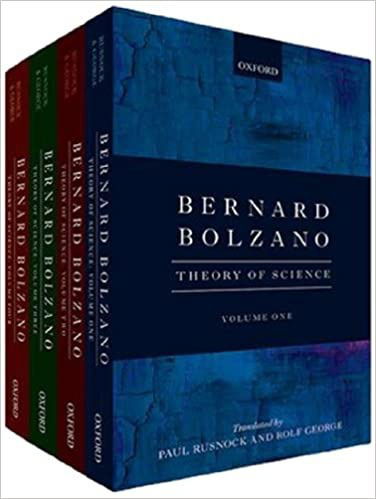
3:16: His decisive step was to go beyond the psychologising, subjective activities of mind needed for scientific knowledge – the enemy for Bolzano was Kant wasn’t it? So can you sketch for us why Bolzano is so important for the development of modern mathematical logic, in particular, his idea of ‘ideas and propositions in themselves’ and how this is a very different approach to logic than Kant and his followers.
PR: Most treatises of logic written by Bolzano's contemporaries spent a great many pages discussing the mind and its operations. This was thought to be a necessary preliminary to the presentation of logic, which, we were told, dealt with the laws of thought. Even the subject matter of logic was psychological: ideas, judgements, and inferences were all routinely held to be mental entities or activities. Confusion between descriptive and normative issues was widespread, as Husserl and Frege would later point out. For example, when we speak of the "laws of thought", are we speaking of the laws that describe how the mind works, or of the laws prescribing how we should think in order to achieve a certain end (e.g., arrive at truth)? To take another example, one of Bolzano's contemporaries, Jakob, tried to explain the law of non-contradiction psychologically, claiming that the mind could not by its very nature unite contradictory ideas in one act of consciousness---such ideas “destroy each other” when one attempts to unite them, he says. If so, no one should be able to think a self-contradictory thought, still less take it to be true (Jakob evidently didn't get out much).
The enthusiasm for psychology also gave rise to overreach, and not just in logic. Hume, for example, wrote in the Treatise that every science, mathematics and natural philosophy included, would be far better off to begin with a study of the mind and its operations. According to this, Newton, in studying mathematics, physics, and astronomy, had wasted a good deal of his time, having had no option but to employ the "tedious lingring method" that was to be rendered obsolete by the new improved one, based on ... armchair psychology? I don't mean to say that scientists had nothing to learn from Hume, but this is just funny.
If you look at modern textbooks of mathematical logic, discussions of mental activities, if there are any at all, are usually confined to the introduction, and are completely absent from the presentation of the theory. Instead, we read about structures, languages, interpretations, proof systems, etc., none of which appear to have any psychological content. Bolzano was very clear about following a similar approach in what he called the "Theory of Elements”, arguing that that part of the theory of science should be developed for “propositions and ideas in themselves”, regardless of whether they had been thought by anyone or expressed. Since he wanted not only to be right but also to win acceptance for his views, he discussed the opposed views of his contemporaries at length, patiently explaining why, in his opinion, they were incorrect. The fact that Husserl and Frege still felt it necessary to hammer away at psychologism over half a century later indicates the degree of his success.
3:16: As you note, Quine rejects propositions and talks about sentences. What’s the difference between Quine and Bolzano and what bearing does Quine’s position have on Bolzano’s?
PR: Quine was interested in a certain kind of ontological economy. At times, he approached such matters in an experimental spirit, asking, e.g., how much of classical mathematics could be preserved in a nominalistic framework without necessarily committing himself to adopt such a framework. At other times, however, he espoused a program of eliminating all manner of entities that he deemed suspect with a kind of missionary zeal. Intensional entities like propositions were high on his list of undesirable elements. Among others, he raised the problem of individuation: how can we be sure, for example, that this sentence and that one have the same meaning and thus express the same proposition? Accordingly, he sought to find ways to develop logical theory without recourse to propositions. For instance, in Philosophy of Logic, he sketches set-theoretical constructions called "sentences" based on elements acceptable to empiricists (e.g., actually uttered phonemes) that can, in his opinion, fill all the necessary roles in logic.
We point out certain difficulties with Quine's approach: his sentences, for instance, seem to be just as difficult to pair with actual utterances as propositions are. Their attributes go far beyond what empirical data would justify. There are further problems with "token synonymy", which were pointed out by Strawson (for example, a sentence of the form ‘If P then P’ or ‘P or not P’ can fail to be true if the different occurrences of ‘P’ are not synonymous). We also note that Quine accepts that future linguistic developments may bring new forms into being, a possibility that seems to be naturally formulated in Bolzanian terms. On the whole, we argue that the Quine's sentences are not as different from Bolzano's propositions as might appear at first glance.
3:16: How did he analyze the representation of natural kinds—was Locke’s position his stalking horse here?
PR: Yes, I think Locke's Essays along with Leibniz's New Essays were the main sources that informed Bolzano's discussion. Locke had written of two kinds of essences of substances, nominal and real. A nominal essence, he says, is a complex idea of observable characteristics: e.g., the nominal essence of gold might be a yellow, fusible, fixed metal of a certain weight. The real essence, by contrast, is an idea that somehow captures what the substance really is (Locke thought, for instance, that the real essence of gold would consist in an idea of its microstructure, one which allowed us to deduce the observable characteristics along with the other properties of gold). Now nominal essences are also claimed to be the meanings of words such as 'gold'. Accordingly, to say that, e.g., gold is yellow would be to state what he calls a "trifling proposition" (analytic in Kant's sense of the subject literally containing the predicate). Yet Locke also says that we may make mistakes in forming nominal essences, framing an idea, for example, that doesn't fit all items of a given kind (perhaps even none), or one that covers items not of that kind. He would say in such cases that we had formed a false idea of the substance. Note, however, that it is according to him a false idea of that substance (e.g., of gold). To take another example: suppose someone forms a nominal essence of whales as large fish with horizontal tails. According to Locke's account it would then be trivially true to say that a whale is a fish, but at the same time this idea (nominal essence) would be a false idea of a whale, i.e., it would be false to say that a whale is a fish. It would seem to follow that a whale is not a whale.
Elsewhere, Locke explains that talk of true and false ideas is elliptical, presupposing a comparison of an object with an idea. The mind, as he says, refers the idea to a given object, and it is this act of referring that either hits or misses the mark. Bolzano, reasonably enough, thought that such reference would involve a judgement (Locke says: a proposition), one of the form: This idea agrees (or disagrees) with that object. For instance: my idea of a large fish with a horizontal tail agrees with whales. Note, however, that in order to form such a judgment, we must already have an idea of whales. But Locke has no explanation of what sort of idea this might be---remember, he said that the nominal essence is what we mean by 'whale'. It thus seems that in such cases we cannot even talk about whales, still less make mistaken claims about them.
Bolzano's proposed solution involves ideas that are simple and singular. He calls such ideas "intuitions" following Kant, who had used the term for singular ideas "in immediate relation to their objects". In language, he tells us, intuitions are expressed by occurrences of bare demonstratives ('this', 'that'); but they are also present, he thinks, in the ideas expressed by indexical words ('here', 'now', 'I', etc.), proper names, and some occurrences of names of natural kinds ('gold', 'human', 'elm', etc.). Simplifying somewhat, Bolzano's view is that, if we have a sample of a natural kind (e.g., whales), we can form an idea of the required kind along the following lines: the species to which this animal belongs. (The complications come about because Bolzano thought that all humanly thinkable intuitions had mental states or changes as objects. So he has to try to explain how we can form ideas of, e.g., whales from ideas of those states and various concepts. On this point, as on others, his views closely resemble Russell's from the "logically proper names" period).
What Locke called a nominal essence is then simply a general concept, which may or may not apply to members of the species in question and nothing else besides (so that, e.g., we can truly say that a whale is not a fish while talking about whales). Real essences, finally, can be thought of as pure concepts (ideas containing no intuitions) that represent precisely the members of a given species. Bolzano agrees with Locke that in most cases we do not possess such concepts, although he adds that we can form ideas of them, e.g.: [pure concept that represents all and only whales].
3:16: You argue that his variation logic has been unduly neglected and is often seen as merely a first draft of Tarski’s when it is much more than this. So can you say why it’s worth getting to grips with Bolzano’s variation logic on its own terms?
PR: Today, logicians customarily begin by specifying a formal (or formula-) language, which is then provided with a semantics and one or more proof-systems. The formal languages will contain constants, some labelled logical, some non-logical (the latter are sometimes called parameters). And the semantics will usually only consider models where the semantic values of all the non-logical constants, but none of the logical ones, vary, and then seek to identify noteworthy invariants of such transformations (e.g., the non-occurrence of the sequence of truth-values TTTTF, or the invariable occurrence of the value T, etc.).
If we wanted to describe what is done in general, as opposed to with a particular formal language, we would get something like Bolzano's account, though his approach has the further difference of not relying on a prior distinction between logical and non-logical concepts.
He does not begin by constructing a formal language, but rather simply assumes that there are articulated entities, which are either true or false, called propositions, the (sub-propositional) parts of which he calls ideas. He then observes that we can consider certain ideas within a given proposition to be variable---by this he means that we can consider other propositions that differ from the given one in having different ideas in the corresponding places. For instance, in the proposition [2•(3+5) = 2•3+2•5], we might consider the ideas designated by the numerals to be replaceable by other similar ideas (like replaced by like), yielding, e.g., [5•(7+19)=5•7+5•19]. And we can also think about the propositional form: `a•(b+c) = a•b+a•c'. Finally, we might notice that, if we permit any ideas of, say, integers to occupy the places indicated by `a', `b' and `c', the result will in every case be a true proposition (Bolzano speaks in this case of universal validity, and would call any proposition of this form analytic). Bolzano's approach accords with the practice of many mathematicians, who often don't work within a particular formal language, and freely make inferences in which non-logical parts remain invariant.
The above case is one where certain non-logical ideas (of addition and multiplication) are not considered variable. There are many others of this kind. Consider, for example the argument:
[Franklin Roosevelt was a 20th-century US president. So Franklin Roosevelt was not born in South Dakota.]
In this case, we can observe that, if the two occurrences of [FDR] are considered variable (replaceable by ideas of individuals), there is no variant of the argument that has a true premise and a false conclusion. Bolzano says in this case that the second proposition is deducible from the first with respect to the idea [FDR]. The above example shows that deducibility does not require that the connection between premises and conclusion be necessary, nor that it be knowable a priori (though, unsurprisingly, he held that there are cases of deducibility that are necessary, some of which are also knowable a priori). There is thus a very clean isolation of truth-preservation as a feature of intrinsic logical interest.
Rolf George pointed out another interesting thing about arguments like the one above, which are often called enthymemes. Often, when presented with such an argument, people will say that it is not valid unless one makes explicit an allegedly tacit premise; in the above example, that no 20th-century US president was born in South Dakota. Note, however, that this premise is equivalent to saying that the conclusion of the above argument is deducible from its premise when the two occurrences of [FDR] are the only variable items.
I will mention one more noteworthy feature of Bolzano's approach. Notice that, because the designation of variable parts can vary from one inference to the next, deducibility is only transitive under certain conditions. Here is a simple example: [Boris Johnson is a mammal] is deducible from [Boris Johnson is a primate] when [BoJo] is the only part considered variable, and [The PM of the UK is a mammal] is deducible from [Boris Johnson is a mammal] when [mammal] is the only variable idea, but [The PM of the UK is a mammal] is not deducible from [Boris Johnson is a primate] with respect to any selection of variable ideas.
Accordingly, Bolzano should have considered failures of transitivity in his presentation of deducibility, and he did, stating and proving theorems concerning the conditions under which deducibility is transitive. Similar problems turned up in the late 20th century, e.g., with respect to counterfactual conditionals, where the possible worlds considered pertinent may vary from one conditional to the next, with the result, e.g., that the argument form called hypothetical syllogism (If P then Q, If Q then R. So If P then R) turns out to be invalid.
3:16: Turning to his theory of knowledge, what was his approach and again, how can we see his approach as being against Kant?
PR: In Bolzano's view, many modern philosophers, Kant included, made the existence of cognition, or knowledge, the starting point of their reflections. By contrast, he started from the claim that there are truths, where by `truth' it is clear that he means a true proposition in itself. Truth in this sense does not require a thinking being: surely, he says, there are many unknown truths. Accordingly, he cannot accept the popular definition of truth as the agreement of an idea with its object, as this would make the existence of truth dependent on mental activity. Moreover, truths are propositions and not ideas for Bolzano, so this definition is aimed at the wrong category of entities, and thus had no hope of success.
Bolzano tended to be conservative in his use of terminology: he used the term `idea' to refer to sub-propositional parts of propositions because most of the logicians he read maintained that ideas were parts of judgments (the closest thing in their theories to his propositions). But many of those those logicians also maintained that ideas somehow resembled their objects: Kant wrote, for instance, that an intuition (a kind of idea or Vorstellung) of a house must contain representations of doors and windows as parts. Earlier, Locke had compared the mind's store of ideas to a collection of paintings. Frege, long after Bolzano's death, wrote that the ideas spoken of in German philosophy are of a "sensible, pictorial character." If so, it is hard to see how such things could fit together to make something that is either true or false.
Not surprisingly, Frege concluded that what were called ideas in the German logical literature (as mentioned before, he seems not to have read Bolzano) had no role to play in logic. It is hard to disagree with him. One of his greatest achievements, for example, was the elaboration of a formal system that could perspicuously represent reasoning involving quantification and bound variables. Linguistically, this amounts to an account of relative pronoun constructions (‘thing… which’, ‘person … who’, and the like) in conjunction with quantifiers (‘all’, ‘some’, ‘none’, ‘two’, etc.). If you are thinking about mental pictures as the foundation of logic, you are very unlikely to see the point of any of this. (Interestingly, Locke does touch on such “particles” in his Essays—but says that they do not by themselves stand for any ideas. For him, they seem to be worth mentioning at most in passing.)
Despite his retention of the traditional terminology, Bolzano's ideas are not at all like those discussed in the traditional literature. First, there are ideas (parts of propositions) that are not even plausible candidates for resemblances of objects: consider, e.g., [not], [which], [and]. Even with ideas that do have objects, however, he noted that the resemblance theory is hard to work out. What sort of a mental image, for example, would be appropriate for the idea of a tool, or a class-action lawsuit, or a concept? Focussing on what matters for truth and valid inference, Bolzano individuated ideas with objects based upon whether (1) they were simple or complex; (2) if complex, in how the parts were arranged (for example, [learned son of an ignorant father] and [ignorant son of a learned father] differ in this respect, though they have the same parts); (3) by their extensions. In the case of simple ideas, extension alone individuates. This looks a lot like contemporary logical semantics, less the modal machinery (which Bolzano attempted to handle in a different way).
The upshot is that many of the characteristic problems of early modern epistemology are pseudo-problems for Bolzano. For instance, not only is it highly unlikely that our ideas resemble their objects, it also doesn't matter for the purposes of logic whether or not they do. The questions that do matter are how we come to make judgments (i.e., take propositions to be true), whether those judgments are correct, how we come to make mistakes, how we can minimize the chances of our being mistaken, etc. To speak of these matters, we must first know about valid inference, probability, etc., and these inquiries do not, in his view, involve consideration of thinking beings or their activities.
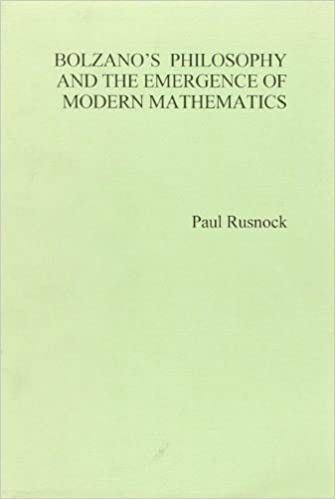
Another important difference concerns his views on the epistemology of mathematics and similar sciences. Since he clearly distinguished propositions in themselves and their objective relations from judgements and their subjective connections, he was able to separate questions of objective logical dependence from the subjective order of knowing. This has a number of interesting consequences that are very much at odds with, e.g., Descartes' understanding of mathematics. For example, Bolzano observed in 1810 that in some cases we may be more confident in the truth of theorems than in the axioms used to prove them---we gain confidence in the axioms by appreciating the role they play in a deductive structure (Russell made a similar point a century later, writing about the “regressive method” of discovering mathematical axioms). And just because certain propositions are of the kind that can be known a priori it does not follow that, if known, they are known a priori.
Kant seems sometimes to have lost sight of these distinctions, at others to be unaware of them. He writes at one place, for example, that since philosophy and mathematics concern matters of necessity, only a priori judgments are acceptable and mere opinions are not to be tolerated in these fields. Also that axioms were immediately certain judgments, etc. Applied to the mathematics of the 18th and early 19th centuries, especially the infinitesimal calculus, these views were simply untenable. For even though the calculus was widely used, its foundations, far from being luminously evident to mathematicians, hadn’t even been discovered.
3:16: His ontology and metaphysics continued the work of Leibniz, Wolff, Baumgarten and now that metaphysics is again a going concern in the analytic tradition thanks largely to its rehabilitation by Lewis and Kripke this again makes him seem pretty contemporary. However, you say he probably makes too many metaphysical commitments for modern tastes. So what is metaphysics for Bolzano and how similar is it to contemporary approaches?
PR: Bolzano at one place describes metaphysics as the science of the actual (real), insofar as it can be comprehended by concepts alone. He was not convinced by Kant’s arguments against the possibility of metaphysical knowledge and continued to work in what many of his contemporaries would have regarded as a pre-critical and dogmatic manner.
Like much of his philosophy, his metaphysics looks both backwards and forwards. On the one hand, he elaborated a kind of monadology, looked for arguments proving the existence of God, the immortality of the soul, etc. At the same time, in seeking foundations for such traditional theses, he sometimes seems more at home in the late twentieth century. For example, some historians have pointed to the disentangling of the three notions of necessity, apriority, and analyticity as an important advance of twentieth-century philosophy. Well, these notions are very clearly distinguished in the Theory of Science. Another forward-looking part of Bolzano’s metaphysics is his theory of collections [Inbegriffe], with its anticipations of later set theory and mereology.
3:16: How does he tackle freedom and necessity?
PR: He started from something very close to Leibniz’s view, which distinguished metaphysical and moral necessities—the former, as Leibniz says, depend only on God’s understanding (and thus hold in all possible worlds), while the latter depend also on God’s will, in particular, His resolution to create this, the best of all possible worlds. Leibniz claimed that the latter were contingent in a sense—other worlds were metaphysically possible, after all. This is a difficult position to defend: for, given that the attributes of omniscience, omnipotence, and holiness that determine God’s choice to create the best of all metaphysically possible worlds are admitted to be necessary attributes of a being that exists necessarily, one can hardly speak of contingency here. Bolzano accordingly recognizes both metaphysical and moral necessities as necessities, and denies that God's choice of the best is contingent. The distinction between these and other kinds of necessities (e.g., physical) is retained, however, since he thinks that we make many different kinds of modal claims.
At the same time, he maintained that there was contingency in the universe, claiming that only the features of the universe that can be determined by concepts alone are necessary. For Leibniz, that is, every detail is fixed by metaphysical or moral necessity, while Bolzano thinks that only a conceptually determined structure is. Another important difference between the two is that Bolzano maintained that metaphysical necessities are independent of both the will and the understanding of God. According to him, for example, 2+2=4 not because God thinks so; rather, because 2+2=4, God thinks so.
His views on freedom evolved over time. At first, he maintained that some actions are free, in that different actions (more precisely, resolutions of the will) are possible for an agent but nothing determines which one is performed. Later, he inclined strongly towards a deterministic view.
3:16: What’s his overall metaphysical and ontological picture of the universe ? He sounds a bit like a panpsychist in the footsteps of Leibniz.
PR: That’s pretty accurate—substances, Bolzano thinks, are simple and unextended, each occupying a point in space at each instant, and each substance has at least basic powers of representation and generates forces. The agreements with Leibniz are fairly broad (e.g., simple substances are eternal, there is a moral as well as a physical order in reality), though he differed on a number of key points. For instance, he claims that both extension and interaction between substances are actual, and not merely well-founded phenomena.
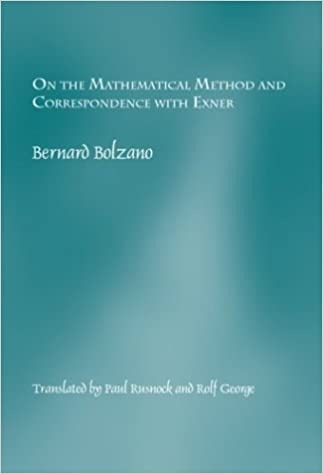
3:16: He was also a great mathematician wasn’t he – so what was what you call his ‘quiet revolution in the philosophy of mathematics’?
PR: Bolzano focussed on the foundations of mathematics---the parts, as he put it, which are "at the same time philosophy." He is best known for his work on the foundations of the calculus, especially his 1817 proof of the intermediate value theorem, as well as later work (unfortunately not published during his lifetime) in which he constructs a continuous, nowhere differentiable function, and uses the Bolzano-Weierstrass Theorem to prove several key results (e.g., a continuous function on a closed interval is bounded and attains its maximum and minimum values on the interval). He also did pioneering work in point-set topology, giving a nice account of classical point-continua, proposing interesting definitions of dimension, etc. And there is interesting work on the theory of collections and the infinite in the posthumously published Paradoxes of the Infinite.
When Jan and I wrote about Bolzano's "revolution" in the philosophy of mathematics , what we had in mind was the programme set out in writings around 1810. We find there a definition of mathematics as the general science of forms, a new classification of mathematical disciplines, and a radically new account of axiomatics, grounded in his separation of the objective order of logical dependence among truths from the subjective order of knowing. Though his logic was underdeveloped at that time, he clearly recognised that logical theory is an integral part of axiomatics, requiring explicit elaboration (a promise he later kept with the Theory of Science).
These early writings also include his first sketches of the theory of collections. The theory of collections is for him the most fundamental part of universal mathematics, itself the most basic part of mathematics. Universal mathematics contains the general science of quantities (arithmetic, algebra, analysis) as well as combinatorics. It is universal because maximally general.
These views on the branches of mathematics have important consequences for proofs of theorems. Take, for example, the intermediate value theorem: a real-valued function f(x) that is continuous on an interval [a,b], which is less than zero for x=a and greater than zero for x=b is equal to zero for some value of x between a and b. As a theorem about continuous functions in general, this belongs to universal mathematics. As Bolzano documented in 1817, however, many of the proofs that had been offered for this theorem appealed to special branches of mathematics such as geometry (consider the graph of the function ...) or kinematics (imagine an object moving ...). But the theorem does not merely concern, e.g., continuous spatial quantities, so an appeal to truths concerning them alone would not have the required generality (it would be like offering a proof of Pythagoras' theorem that appealed to properties that belong only to isosceles right triangles). At best, the property in question might be one that all continuous quantities share. But in that case, the appeal to geometry is eliminable, since we can and should instead appeal to the general property. Here, however, things get even worse, for the properties usually appealed to were equivalent or even identical to the intermediate value property, making the proofs elaborate exercises in begging the question. To have explained this so clearly is already a great achievement. To follow it up with a proof that meets (most of) the requirements of his new methodology is, we think, amazing.
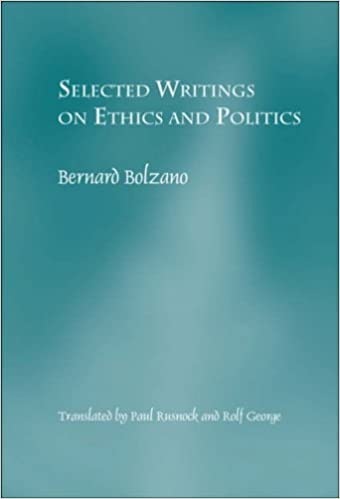
3:16: He was a rebel priest as well wasn’t he and wrote about ethics – what was his approach to both theology and ethics – would he fit into any of the contemporary ethical categories such as utilitarian consequentialism, or Kantian deontology or virtue ethics or was he doing something different from anything like these?
PR: I don’t think it would be fair to call Bolzano a “rebel priest”, though the fact that some in positions of authority took him for one says a lot about the political situation of the time. For Bolzano was a sincere Catholic who got into trouble, it seems to me, precisely because he expected the authorities of his day (in both Church and State) to live up to the teachings of the Catholic religion, and because he was not afraid to point out their failures to do so.
In Bohemia at that time, the Church was primarily responsible for education, health care, and a number of other social institutions, and the state was at least supposed to be guided by its doctrines. Bolzano’s practical work as a teacher was aimed at training a generation of young people to fill positions of authority, and to live up to their responsibilities. He also saw it as his duty to denounce injustice, e.g., the ill-treatment of women, the Czech-speaking population, or the Jews of Bohemia, or the abuses that flowed from differences of rank, hereditary rights and privileges, etc. This approach was very much in line with the programme of Joseph II.
Bolzano’s problem was that, after the deaths of Joseph (1790) and Leopold (1792), Bohemia was ruled by an emperor (Francis II, aka Francis I of Austria) who was strongly opposed to pretty much everything Joseph had stood for. Roughly speaking, there was a shift from enlightened absolutism to anti-enlightenment absolutism. As bad as he thought the government of Francis was, however, Bolzano did not call for rebellion or revolution, instead advocating education, reform and, when necessary, various forms of peaceful civil disobedience. This is not to say that he thought violent resistance unjustified in all cases. The contemporary situation in Ireland, for example, was so dire in his opinion that violent resistance would be justified if there was a reasonable prospect of success.
In ethics, Bolzano was an act-utilitarian, though he sometimes added that the results aimed at by actions should be Pareto-optimal, i.e., the average increase in well-being should be as great as possible, subject to the proviso that no individual would be worse off. This being said, he argued that act-utilitarianism could ground a number of general rules of conduct, as well as a theory of rights.
3:16: What were his views on aesthetics and ‘the science of beauty’? How did he approach the topic philosophically given that he disagreed with treating aesthetics as an essential part of any philosophical system? And is Kant again his opponent here?
PR: Bolzano worked on aesthetics in the last years of his life. He approached this subject in his usual way, looking carefully at the work of predecessors and attempting first to clarify key concepts. He gave a number of talks on aesthetics at the Bohemian Royal Society in the 1840s, and two essays based on them were published in the nineteenth century: "On the Concept of Beauty" and "On the Classification of the Fine Arts". In the essay on the concept of beauty, he proposes an analysis more or less in line with the classical German tradition that saw beauty as the indistinct or confused cognition of perfection, or unity in variety. Since confused cognition was often identified with sensory cognition, beauty was sometimes characterized as sensibly cognized perfection, e.g., by Baumgarten (whence the odd choice of 'aesthetics' for the branch of philosophy dealing with beauty). Bolzano tries to respect what he took to be the insights of these philosophers while reworking the details.
He agrees that the contemplation of the beautiful can be pleasant and involves the apprehension of order or regularity in a broad sense (and thus has cognitive elements), that this apprehension is usually fluid and indistinct (i.e., we are generally not aware of the various mental activities involved, though in some cases we can be), and that there is a kind of universality in aesthetic claims. At the same time, he rejects what he took to be errors of the Leibniz-Wolff school, including the identification of confused representations with sensations, and the confusion of ideas with their objects. In the end, he settles on a definition according to which something is beautiful if the contemplation of it by suitably prepared persons can give rise to fluid but indistinct cognitive processes that apprehend order in the object, and which give us pleasure by virtue of exercising and developing our cognitive powers. The essay on the fine arts follows this up with a surprisingly open-minded view of possible kinds of artworks, including purely mental ones.
When Bolzano wrote that aesthetics should not be considered "an essential part of the philosophical system", he had in mind a picture according to which corresponding to our three basic powers (thought, will, sensation), there must be three main divisions of philosophy (logic, ethics, aesthetics). Since he rejected the view that aesthetics was specially concerned with sensation, he couldn't go along with this. This is not to say he thought aesthetics unimportant, however.
In the essay on the concept of beauty, Kant's aesthetics is examined in detail. As you might expect, the logician Bolzano is not happy that Kant offered four different definitions for a single concept, nor with the shaky arguments given to support the claim that these definitions were equivalent. Nonetheless, he tries to find common ground with Kant whenever possible. It is the philosophers after Kant, notably Hegel, who come in for the harshest criticism. As Bolzano saw it, they were often deliberately obscure, while Kant had at least tried to make sense.
3:16: And finally, are there five books you can recommend to the readers here at 3:16, other than your own, that will take us further into your philosophical world?
PR: Since all your questions were about Bolzano, I will start with him.
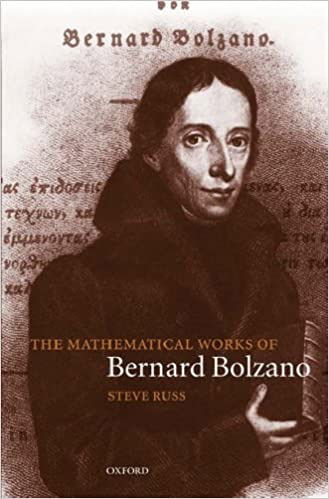
The Purely Analytic Proof is perhaps the best introduction to his approach to the foundations of mathematics and, I would add, one of the great works of nineteenth-century philosophy. It has been translated into English by Steve Russ and is included in the collection The Mathematical Works of Bolzano (OUP, 2010).
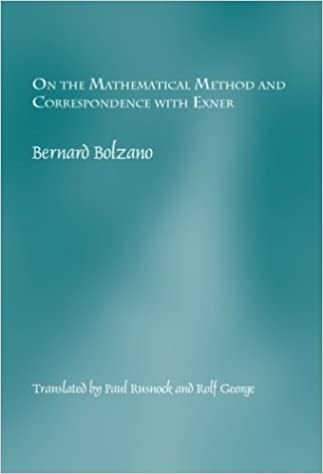
For his logic, there is, besides theTheory of Science (English translation OUP, 2014), a much shorter text called “On the Mathematical Method” (In English in the volume On the Mathematical Method and Correspondence with Exner, Rodopi, 2004).
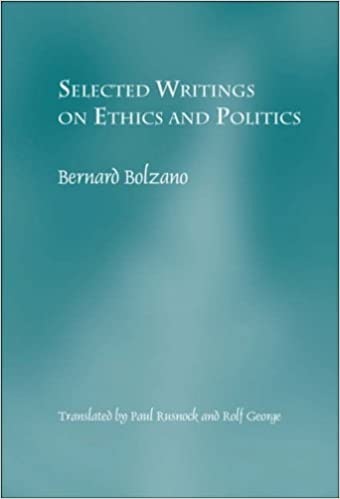
For his practical philosophy, see the volume Selected Writings on Ethics and Politics (Rodopi, 2007).
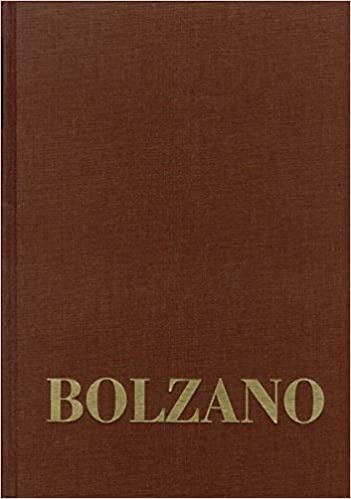
In my opinion, the best presentation of his philosophy of religion and his understanding of Catholicism is an exchange of letters with his friend Stoppani entitled On the Perfectibility of Catholicism (only in German for the time being).
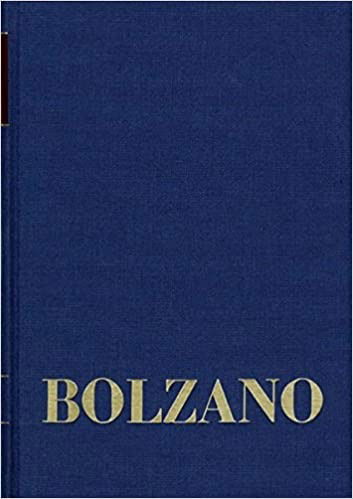
For those who want more and can read German, there is an excellent critical edition of Bolzano’s works: the Bernard Bolzano-Gesamtausgabe, published by Frommann-Holzboog in Stuttgart.
Finally, the aesthetical writings have been translated into French by Carole Maigné et el. (Ecrits esthétiques, Vrin, 2017).
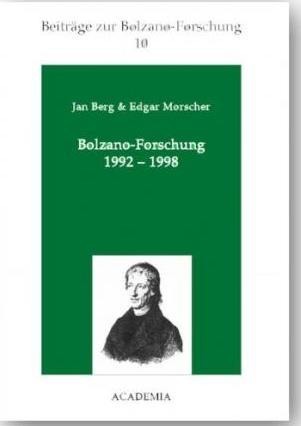
Secondary literature: after the Stanford Encyclopedia articles by Edgar Morscher and Jan Šebestík, a good place to begin is with the series Beiträge zur Bolzano Forschung (Academia Verlag), which has many excellent volumes, including several collections of papers by different authors (some in English, some in German).
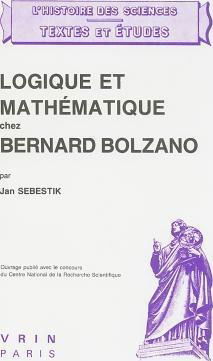
Concerning his mathematics, I highly recommend Jan Šebestík’s Logique et mathématique chez Bernard Bolzano (Vrin, 1992)
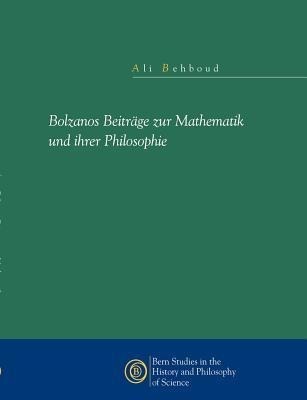
as well as Ali Behboud’s Bolzanos Beiträge zur Mathematik und ihrer Philosophie (Bern Studies in the History and Philosophy of Science, 2000).
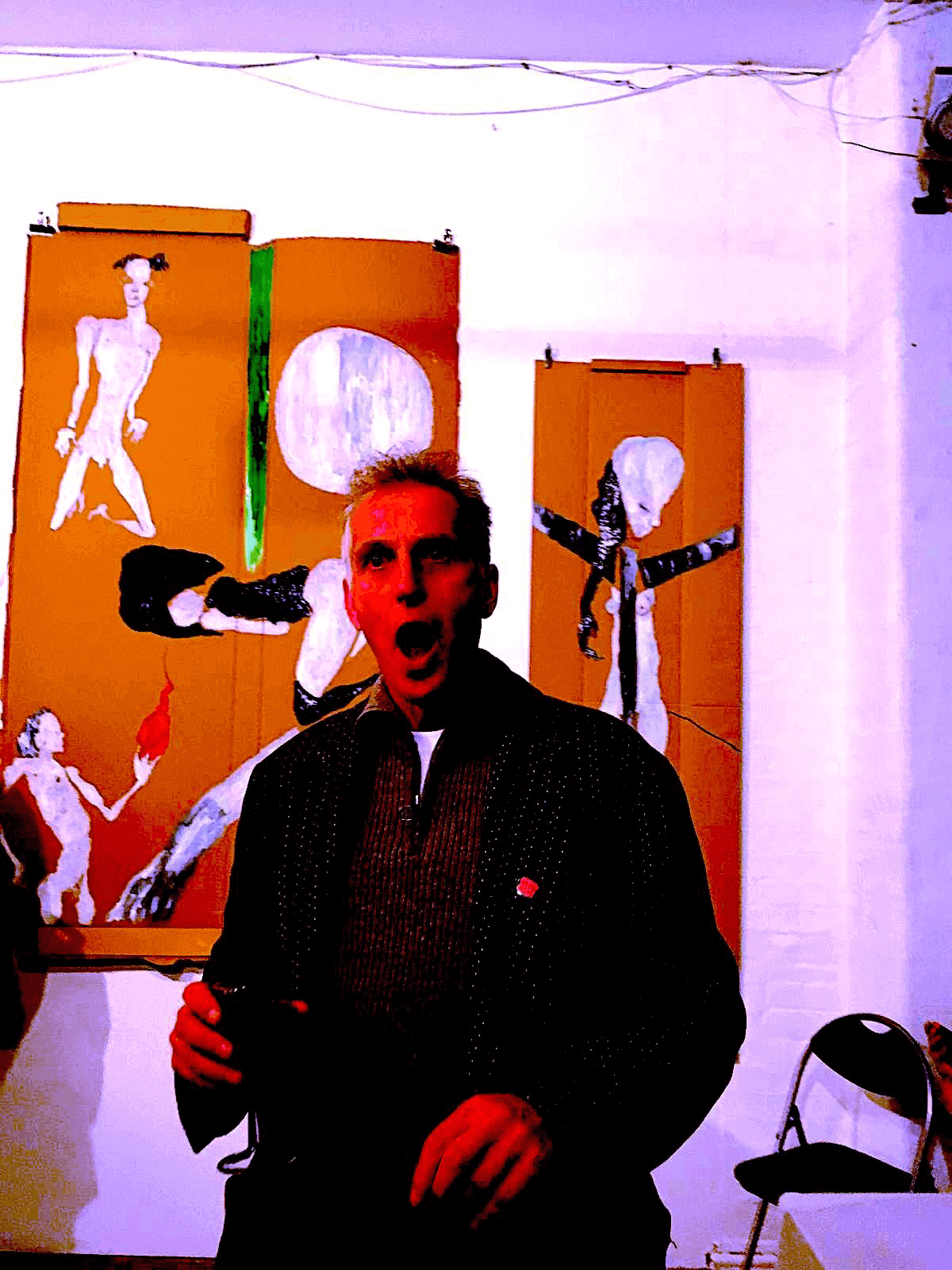
ABOUT THE INTERVIEWER
Richard Marshall is biding his time.
Buy his second book here or his first book here to keep him biding!
End Times Series: the index of interviewees
End Time series: the themes
As for my recommendations, here are four books that seem to me to successfully combine historical research with matters of contemporary interest, each in its own way. J. Alberto Coffa, The Semantic Tradition from Kant to Carnap: to the Vienna Station (Cambridge UP, 1991). Wolfgang Künne, Conceptions of Truth (Oxford UP, 2003). Peter Simons, Philosophy and Logic in Central Europe from Bolzano to Tarski (Kluwer, 1992); and Pavel Tichý, The Foundations of Frege’s Logic (De Gruyter, 1988).
---And two favourite novels that are also part of my philosophical world: Flann O’Brien, At-Swim-Two-Birds, and Jaroslav Hašek, The Good Soldier Švejk. Finally, for those who have some experience in university administration, John Gall, Systemantics (the 1st edition, from 1975, is the best).